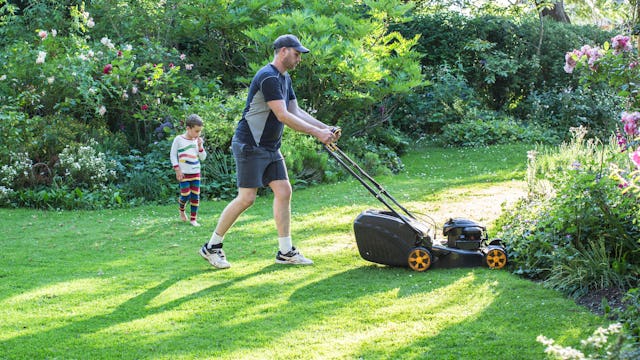Lawnmower Parenting Is The New Helicopter Parenting And Teachers Aren't Feeling It

‘Lawnmower parents’ are the new helicopter parents according to teacher’s viral post
According to a teacher who wrote an anonymous post, “lawnmower parenting” is the new helicopter parenting — and teachers are not here for it.
The post went viral after going up on the site WeAreTeachers and it’s easy to see why: people are going to feel very strongly about this label one way or the other.
First of all, let’s clarify what this teacher means by “lawnmower”: A helicopter parent hovers. A lawnmower parent will “go to whatever lengths necessary to prevent their child from having to face adversity, struggle, or failure,” according to the teacher’s post.
They write of a scenario where a dad rushed a super fancy water bottle to school for his teen daughter. The teacher writes, “‘Remy kept texting me that she needed it. I texted back, Don’t they have water fountains at your school?, but I guess she just had to have it out of the bottle.’ He laughed, as if to say, Teenagers, am I right?”
The teacher wasn’t laughing.
“I took a deep breath through my nose. ‘Oh, I have one of those—I love mine, too,’ I said. But I’m pretty sure my eyes were saying, WHAT ON THIS ACTUAL EARTH.”
The teacher acknowledges that most of these parents “come from a good place,” possibly internalizing any shame they felt from failure in their own childhood. “Any of us—even non-parents—can empathize with the motivations of a person not wanting to see their child struggle,” they write.
But as the teacher points out, removing all struggles doesn’t really do much to prepare kids for a future that will be full of them — and that probably won’t include a parent by their side, ready to tackle everything in life that sucks. “We are creating a generation that has no what idea what to do when they actually encounter struggle,” she writes.
She explains that when encountering situations like a bad grade in college, kids who have had their entire lives “mowed” for them by a parent will respond in ways that aren’t exactly healthy. They might blame the professor, beg their parents to intervene, assume they failed because they’re stupid, the list goes on.
The teacher then tells the story of a mom calling on behalf of her son asking for an extension on a project — something the teacher felt her son should’ve been OK with doing on his own. The mom’s reply is pretty cringe-y: “Oh no, it’s nothing like that, he loves you,” she explained. “I just usually handle this kind of thing for him.”
“What kind of thing? I wanted to ask. Anything less than perfectly comfortable?”
Yikes.
The teacher says that some kids have true anxiety, but that I’m not sure that the solution for every sensitive child is to remove as much struggle as possible.”
Confession: I’m a recovering lawnmower parent. My daughter’s birth was traumatic and at various points, there was talk of some scary shit happening to either her or myself. When life starts off that way, you tend to look at things a little differently. I found myself over the years doing all I can to make her life as obstacle-free as possible, because there was a time when I wondered if we would have this life together at all. She’s a sweet kid — definitely not the type to sink into being spoiled too easily, so the evidence of my mowing wasn’t really there until last year.
She kept forgetting her violin on lesson days. I would start work and the school’s phone number would flash onto my phone. She would tearfully beg me to bring it in so she wouldn’t get into trouble and I’d instantly go into lawnmower mode, and after several instances of a forgotten violin rushed to school, my husband was all, “It’s not sinking in, huh?”
Yeah. It wasn’t.
How could it? I was fixing the problem every time. I was never letting her have that moment of walking into class with her head down explaining that she had forgotten her violin. Just one instance of my letting her feel her mistake would be enough to sting — and make her remember next time. So that’s exactly what I did one dreary day in April when I had been the hero an average of twice a month the entire school year — and the school year before. I let her fall flat on her face. And guess what? She never forgot her violin again.
There will still be times where I feel like I need to zoom over on my “Mommy’s Here” tractor and smooth the bumps, but the thing is, I’m trying hard not to. I know I’m not doing my kids any favors when I remove every bad thing in life and allow them to feel no pain or consequences.
The anonymous teacher agrees. “If we want our children to be successful, healthy adults, we must teach them how to process through their own challenges, respond to adversity, and advocate for themselves.”
This article was originally published on